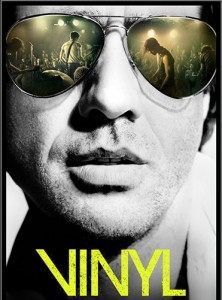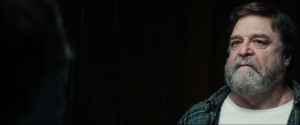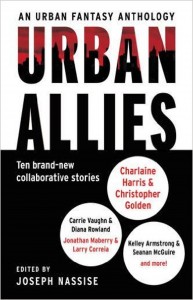
Vinyl on HBO
The combined age of the main forces behind HBO’s new original series, Vinyl, is 200. That by itself means nothing, and lord knows when I am 73 years old, like Martin Scorsese is, I hope I am half as spry and mentally nimble as he is. Same for Mick Jagger at 73, and even Terrence Winter, the relative child here at the ripe old age of 55.
Watching their new show, however, you get the sense that it does matter, at least a little. Not simply because it’s a period piece set in 1973, or even because it’s a period piece that reconstructs certain events in a slavishly worshipful way that implies these events meant something to these men, in a personal way. But because the story they’re telling, at least through two episodes (as I write this) is one of those stories that seems pretty bare-naked in its psychological underpinnings, which in this case seems to strongly imply that these three old white guys are firmly looking backwards at this point in their lives. Because while there’s certainly an exciting story in the American music scene of the early 1970s, with the Summer of Love years in the past and punk rock bubbling under like acid, what Vinyl mainly is is a bubbling pot of clichés involving midlife crises, rock n’ roll as mystical energy binding the universe together, and, as Richard Hell put it, Scorsese’s “relentless framing of life as nothing but competition among men for power — represented by money, willingness to betray and kill, cocaine, and pussy.”
This is Not For You
Privilege is awesome, let me tell you — you simply must try it someday — but it can really fuck with your head. When you’re younger and moderately affluent, everything seems like it was made for you, because it was. And even the stuff that isn’t made for you seems like it ought to be, or at least seems like you should be able to just wander over and get into it. And then you get older, and the world shifts, and things stop being aimed directly at your pleasure centers. They throw you over for a younger crowd, or a more diverse crowd, or just a different crowd, and there you are: Middle aged or thereabouts and confused. Why are people so excited about this new thing that you don’t get? It’s maddening!
I recall back in the days when Anthrax and Public Enemy were vibrant parts of pop culture, and their collaboration was Big News. I went to see them play a gig at the New Ritz (or maybe it was the Old Ritz, who the fuck can remember) and being super excited. The place was crowded with Public Enemy fans who were not in the least interested in skinny white kids like me, desperately trying to mosh around, and I got a bit roughed up when PE left the stage and half the crowd simply walked out rather than stick around for Anthrax. They weren’t friendly. It wasn’t for me, but I’d been convinced it was.
Anyway, Vinyl. Vinyl is the story, so far, of successful record producer Richie Finestra, who started off like everyone in the record business by screwing over a poor black artist and in 1973 is principal shareholder and CEO of American Century Records, a record label in trouble. Richie is struggling to stay sober, hates half the artists his company has on its roster, and is destined by the end of the first episode to have the sort of violent epiphany that only happens in fiction. Vinyl is a smorgasborg of things you have heard before, including the rather ancient saw about how Rock n’ Roll is some sort of primitive energy superpower that can change your life as long as you don’t lose sight of it.
I mean, seriously. This is 2016. Rock n’ Roll ain’t what it used to be, but here’s another story about how a moribund musical genre was once the most powerful force in the universe. But what it really is Scorsese, Jagger, and Winter looking back on a time when everything was, in fact, meant for them.
The Good Old Days
Most people have those moments when an experience kicked you in the ass. And for a lot of people — myself included — many of those moments included a discovery of music. Whether it was the first song you heard that really made you feel something, or a soundtrack to a special moment, we’ve all been there. So there’s nothing wrong with the way Winter and Scorsese pepper Vinyl‘s narrative with hallucinations of famous rock stars performing — Bo Diddly suddenly appearing at a birthday party, Jerry Lee Lewis turning up in an office, Karen Carpenter singing along to her own song on the radio in a car sailing down the highway. These moments are self-indulgent but passably interesting.
The thing is, Rock n’ Roll is no longer the magical culture-changing power it was in the 50s or 60s or 70s or, god help us, the 80s or 90s. We can argue about exactly when Rock n’ Roll stopped being a magical force that changed lives — some might argue it never was, of course — but the fact is any story that is predicated on just how powerfully transformative music can be is a snooze. What Vinyl represents is the recollection of people for whom Rock was personally transformative. We’re supposed to believe it because they can scrounge up the budget to have someone impersonate The New York Dolls and then film a nicely edited sequence where the sheer power of Personality Crisis brings a building down on Richie’s head and he walks away with that dazed look of wonder that truly powerful music can inspire. You know, the sort of music that makes buildings collapse. Because it’s so powerful.
Buried in that tired narrative, however, is something else: The constant refrain in the show’s first two episodes that popular music is crap. So far, characters on Vinyl have slagged just about every dubious rock artist of the era, from Chicago to ABBA to Emerson, Lake, and Palmer to Donny Fucking Osmond. With the smugness of hindsight, all the cool characters know this music is shit, and the music they love — old jump blues, the Dolls, Black Sabbath, burgeoning punk rock — is the real good stuff. But what they’re really saying, I think, is that today’s music sucks. Because it’s not for them. They can have someone on the show disparage Jethro Tull because it’s 2016 and seriously, no one can believe that Jethro Tull was a thing. But under that is the implication, I think, that if Richie were to wake up in 2016 he would be horrified at what’s happened to pop music, because, I suspect, Scorsese, Jagger, and Winter are horrified.
That Last Grasping Moment
Time leaves us all behind. I think people of a certain age who grew up with Rock n’ Roll’s first wave could wrap their heads around punk rock and heavy metal and grunge because they were just permutations, evolutions. They were even at times a return to roots, to a simple chord structure and insistent beat and personal lyrics. You could go from Jerry Lee Lewis to Television in just a few hops.
By 2016, things have changed. Rock is in such serious decline the only time you hear about a guitarist is when they wheel someone like Joe Perry out onto the stage to lend some hot licks to the goddamn new Pitbull song. If the last time you thought you had your finger on the pulse was when CBGB’s was still booking acts, it sure must feel like everything’s gone to hell, and telling a story about a coked-out record executive whose life is changed by The New York Dolls seems like a bold statement. It isn’t though. It’s just kvetching that not everything is for you.










